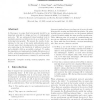Free Online Productivity Tools
i2Speak
i2Symbol
i2OCR
iTex2Img
iWeb2Print
iWeb2Shot
i2Type
iPdf2Split
iPdf2Merge
i2Bopomofo
i2Arabic
i2Style
i2Image
i2PDF
iLatex2Rtf
Sci2ools
104
click to vote
IJNSEC
2007
2007
Injecting Heterogeneity Through Protocol Randomization
In this paper, we argue that heterogeneity should be an important principle in design and use of cryptographic protocols. We use automated formal analysis tools to randomly generate security protocols as a method of introducing heterogeneity. We present the results of simulations for the case of two party authentication protocols and argue that choosing protocols randomly out of sets numbering in the hundreds of millions is practical and achievable with an acceptable overhead. To realize the simulation, we implemented a highly efficient protocol verifier, achieving approximately two orders of magnitude improvement in performance compared to previous work.
Related Content
| Added | 15 Dec 2010 |
| Updated | 15 Dec 2010 |
| Type | Journal |
| Year | 2007 |
| Where | IJNSEC |
| Authors | Li Zhuang, J. D. Tygar, Rachna Dhamija |
Comments (0)

